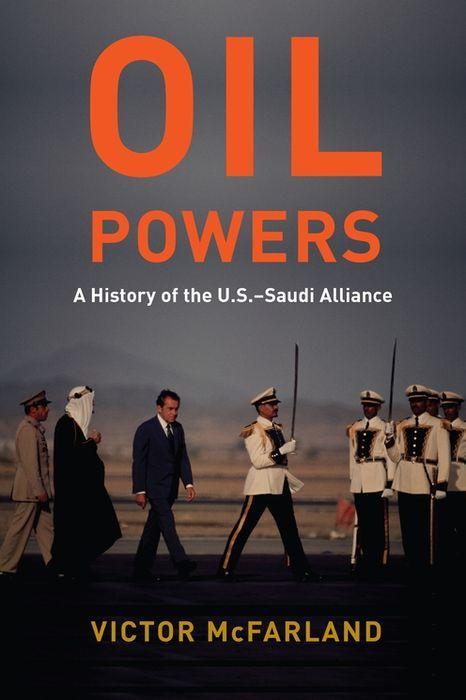 Oil Powers: A History of the U.S.–Saudi Alliance, Victor McFarland (New York: Columbia University Press, 2020), 376 pp., cloth $140, paperback $35, eBook $34.99.
Oil Powers: A History of the U.S.–Saudi Alliance, Victor McFarland (New York: Columbia University Press, 2020), 376 pp., cloth $140, paperback $35, eBook $34.99.
Since its earliest days in the 1930s, the U.S.-Saudi alliance has in many ways been a marriage of opposites: In the beginning, it consisted of an industrial capitalist democracy—a global hegemon, by all measures—paired with a newly consolidated agrarian monarchy that was not even a regional power. Though much has changed over the years—Saudi Arabia’s economy has boomed as a result of oil and the country is now a major regional power—the two countries have never had much in common. The United States and the Kingdom of Saudi Arabia are conventionally understood to have formed and maintained an alliance that was an inevitable outcome of energy politics—America fostered rising energy demand, and Saudi Arabia harbored abundant energy resources. In Oil Powers, Victor McFarland contests this dominant narrative. He deftly uses historical data to take the reader back to the Kingdom’s infant days, showing that a series of diplomatic, social, political, and economic ties between the elites in both governments served as the precursor to their continued alliance today.
One event that drew both countries toward each other is the Great Depression, McFarland argues. A nascent kingdom that was not unified until 1932 was already struggling to maintain its profits when its primary source of financial sustenance—the tax collected from the hajj pilgrimage to Mecca—dried up due to curtailed financial freedom limiting travel. For the United States, the Great Depression was an economic wake-up call, arriving in tandem with the U.S. government’s assessment that its domestic oil resources were becoming scarce, driving fears of oil insecurity. As such, a cash-strapped Kingdom was eager to allow the United States, through the interests of American private companies, to enter its fields in pursuit of the discovery of oil—a discovery that aided in lifting both countries out of the Great Depression.
McFarland’s book tackles much of the domestic development and resistance that both countries have faced in their years of partnership, filling a gap in existing scholarship on the alliance. The author takes note of the countless ethical quandaries that plague the domestic space of both countries when it comes to the alliance. Such quandaries are not unique to the present day; they have been in existence since its inception. Historically—for the Saudis—an alliance with the United States meant supporting a country whose primary ally in the region, Israel, is a pariah in the Arab world. For the United States, there has long been a tension between supporting a monarchy that is antagonistic toward its democratic ally, Israel, and that has been associated with terrorist activities in the region and around the world. Despite these tensions, McFarland’s book shows that the alliance has persisted due not only to mutually beneficial interests in the form of security and energy politics but also to a series of diplomatic relationships between the elites of both governments that can be traced back to the early twentieth century.
Oil Powers is a riveting read. McFarland’s well-marshaled historical analysis illustrates that the roots of the alliance are far more profound than daily punditry suggests. He neatly weaves together a narrative that will interest political scientists and historians alike. Beyond academia, anyone with an interest in energy politics, the role of the United States in the Middle East, or the U.S.-Saudi alliance, more specifically, will greatly benefit from reading this book.
—The Editors
More in this issue
Spring 2022 (36.1) • Essay
Introduction: Moral Injury, Trauma, and War
In August 2021, the United States withdrew from Afghanistan, ending a twenty year war—the longest in American history. The past two decades of armed conflict, ...

Spring 2022 (36.1) • Review Essay
Identity and Shared Humanity: Reflections on Amartya Sen’s Memoir
The concept and implications of our shared humanity are central to the questions of where we belong, who we are, and how we relate to ...
Spring 2022 (36.1) • Review
Delta Democracy: Pathways to Incremental Civic Revolution in Egypt and Beyond
Delta Democracy makes important contributions to scholarly literature and to our understanding of international development and foreign policy concerning the complex role of nongovernmental organizations (...